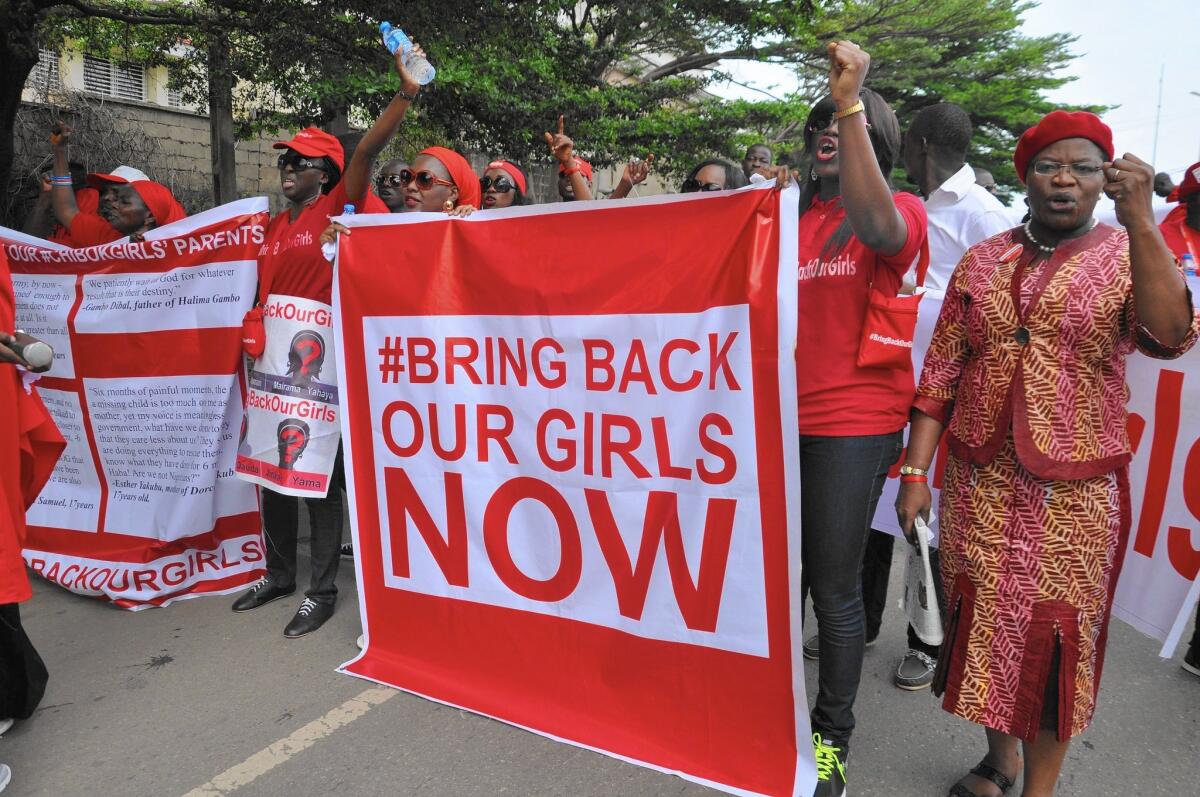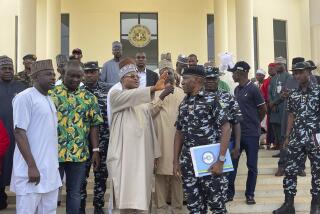Attacks continue after Nigeria’s truce with Boko Haram militants

Nigeria’s week-old cease-fire with the militant group Boko Haram is in doubt, with dozens more women and children abducted and other near-daily attacks by insurgents.
The fate of 219 schoolgirls abducted in April from the town of Chibok remains unclear, as does that of hundreds of other women and girls kidnapped in smaller groups in the region.
Militants abducted about 40 women from the village of Gavva four days ago, said Michael Yohanna, a local government official from the nearby town of Gwoza. In the same attack, 26 people were killed, he said.
Yohanna said attacks had continued unabated after Nigeria’s military announced the cease-fire deal Oct. 17. Boko Haram has battled the military for control of northern Nigeria, where it seeks to impose a strict form of Islam.
“The fact is, that cease-fire is only on paper,” Yohanna said in a phone interview. “Since they announced the so-called cease-fire, there have been continuous attacks in these places.”
Yohanna said villagers and their children had fled into the hills, where they had no access to food and little water. Even in Lagos, Nigeria’s biggest city, there is little appreciation of the catastrophe unfolding in the region south of Maiduguri, where militants have seized a large swath of territory and the military has no control.
The day after the cease-fire was announced, gunmen attacked the villages of Waga Mangoro and Garta, in Adamawa state, and abducted 60 women and girls, Nigerian news reports said Thursday.
Another village, Pelachiroma, was attacked Monday, according to news reports. On Wednesday evening, five people were killed in a bomb attack on a bus station in Azare, in Bauchi state.
Government officials said last week that they had reached the cease-fire accord with Boko Haram in negotiations mediated by officials in Chad. A Nigerian presidential aide, Hassan Tukur, in comments published Wednesday by This Day newspaper, said that the militant group’s representative, Danladi Ahmadu, had indicated that the 219 girls taken in Chibok would be released, but it was not clear when. He said Boko Haram had approached the Chadian government seeking peace talks and that negotiations were continuing after the accord.
The extremist Islamist militia calls itself Jamaatu Ahlis Sunna Lidda Awati Wal-Jihad but is popularly known as Boko Haram, which translates as “Western education is a sin.” Some observers have raised questions about whether Ahmadu represents Boko Haram’s leader, Abubakar Shekau, who has not spoken publicly about the cease-fire.
In addition, the group has splintered into several factions in the last few years, meaning that even if the original faction agreed to the cease-fire, others might continue their fight, abducting girls and women and killing boys and men.
It’s not clear whether the insurgents who launched the recent spate of attacks were members of Shekau’s group. Islamist attackers generally arrive on motorcycles, spraying gunfire, and there is no way for victims to tell which faction is attacking.
Yohanna said that when insurgents attacked Gavva four days ago, they pursued villagers as they fled into the hills, shooting men and abducting women. They looted houses and stole animals and food, in the kind of attack that has been typical in the region since early 2013.
He said that in recent weeks hundreds of people, including women and children, fled another village, Ngoshe Sama, after militants attacked. They, along with people from other villages, were trapped in the mountains without food and with no way to escape into neighboring Cameroon because insurgents controlled the roads.
“People are besieged by these insurgents. The hills are surrounded by insurgents. There’s no way for them to come back down to get food, and there’s no way that we can get food to them,” Yohanna said. He said some villagers took generators when they fled and were able to charge their cellphones to get information out about the attack.
“Just this afternoon they phoned me and said that people have resorted to eating grass and leaves and roots. There’s no food. The children are dehydrated. They were asking me to see if they can be assisted,” Yohanna said.
Yohanna is among those who fled Gwoza, which is under the control of the militants, who also control the towns of Madagali, Gulak and Michika, near the Cameroonian border. He went to Abuja, the capital.
“This area is all under complete control of the insurgents. They’re all over,” he said. “There’s no way [Nigerian] military can come.”
He listed other villages where people had fled and were trapped in the bush without access to food: Ngoshe Zalidva, Bokko, Pulka and Wala Zalidva.
To Yohanna and others in the region, the global focus on the Chibok girls is puzzling, representing a tiny sample of the hundreds of girls kidnapped, forced to convert to Islam and to serve Islamist militias. Many are forced to marry their captors.
Yohanna said the only difference was that the Chibok case was “was done in a group. I think that’s why it got the attention of the media and the authorities. But these abductions have been going on for a very long time. They will abduct 20 one day, five another day, 10 another day.
“Those who escaped are telling us a lot of horrible things about what is going on. One lady who escaped told us a horrible story about how 20 men raped her. And those things are still going on.”
This Day newspaper cited witnesses from Garta confirming Saturday’s attack and abduction of 60 women and girls.
Nigeria’s House of Representatives on Thursday approved a request from President Goodluck Jonathan to obtain a $1-billion loan to buy military equipment to help its forces overcome the insurgency.
More to Read
Start your day right
Sign up for Essential California for news, features and recommendations from the L.A. Times and beyond in your inbox six days a week.
You may occasionally receive promotional content from the Los Angeles Times.






